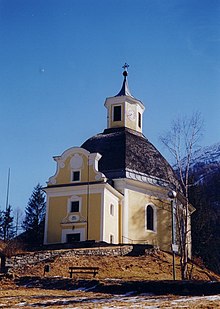Wild waters
| Movie | |
|---|---|
| Original title | Wild waters |
| Country of production |
Germany , Austria |
| original language | German |
| Publishing year | 1962 |
| length | 98 minutes |
| Age rating | FSK 12 |
| Rod | |
| Director | Rudolf Schündler |
| script |
Maria von der Osten-Sacken , Hans Billian , Wolf Neumeister |
| production | Astra Filmkunst, Miksch Filmproduktion |
| music | Heinz Neubrand |
| camera | Siegfried Hold |
| cut | Renate Jelinek |
| occupation | |
| |
Wilde Wasser is a German-Austrian homeland film by Rudolf Schündler from 1962.
action
Thomas Mautner is the "unwanted" son of the sawmill owner Mautner. Thomas owns large parts of the family land that he inherited from his mother. Investor Sternberg and Baron Ferdinand von Lindner plan to build a motorway not far from the Mautner sawmill and to build a hotel and a new sawmill on Thomas' property. Thomas' father rejects the two men's purchase offer on behalf of his son.
Thomas himself is too busy turning the heads of the women in the village. He would like to be a musician and has secretly taken lessons at the Vienna Conservatory. He plays the organ in the village church. Here he meets Magdalena Ullmann, who works as a nanny for Baron von Lindner. He's flirting with her. A short time later he saves the young Andrea from drowning from a torrent - she turns out to be Sternberg's daughter. After an argument with his father, Thomas leaves his village and goes to Bad Gastein , where he meets Andrea again. She lives here with her fancy friends in a hotel, spends money in the casino and enjoys herself with the farmer Thomas at her side. Thomas tries to keep up with their standard of living and borrows a fortune from Sternberg, who has him regularly sign the relevant promissory notes. When Thomas has lost his last money in the casino, Andrea drops him. Sternberg, in turn, wants his money repaid within three days, otherwise he would seize Thomas' property.
Magdalena was also dropped. First the baron proposed to her, but withdrew it when he found out that she was the mother of an illegitimate daughter. Magdalena and Thomas meet in Bad Gastein, fall in love and get engaged - he assures her of his love despite their illegitimate daughter. Magdalena convinces him to go back to his village to his father and tell him about his financial misery.
The father wrote out a check for Sternberg for the debts, but Thomas should now work off the money from him. Magdalena is brought into the village by his brother Markus without Thomas' knowledge and lives as a supposed summer guest in the local hotel with Förster Böhmel. Böhmel places Magdalena as a secretary to Thomas' father, but she quickly confesses to him that she and Thomas want to get married. He refuses to give his consent, but Thomas sticks to his decision. When his father gets to know Magdalena's daughter and also feels his son's love for Magdalena, he gives his consent to marriage and from now on regards himself as a proud grandfather.
production
Wilde Wasser emerged from July 17 to August 22, 1962 in Bad Gastein , Bad Hofgastein and the surrounding area. The first meeting of Thomas and Magdalena was filmed in the Böckstein church "Maria zum guten Rat".
The main committee of the FSK originally approved the film by majority vote only from the age of 18. The examiners described it as a “homeland schnulze” as well as “kitschy, so fake and alien to life”. He said he was "superficially noble", but made it easier for young people to "form opinions about love and sex in the direction that responsible adults should prevent."
The film was mass-launched in cinemas in numerous cities on October 26, 1962.
Reviews
Gertraud Steiner criticized the film in Die Heimat-Macher. Cinema in Austria 1946–1966 . With the story of the farmer's son, who moves to the “modern” world and returns ruefully, director Schündler has taken up a popular Heimatfilm topic, whereby Thomas's transformation is exemplarily depicted through his relationships with women: Only Magdalena can be “pure, blonde, asexual and distanced ideal woman ”, who, like Maria Magdalena, made a mistake, but has since lived without blame.
The film emphasizes the cliché of the superiority of the haves over the haves, worked out both on the figure of the traveling merchant Sigi, who is arrested as a marriage fraud in the end, and on Mautner's foreign servant Johanna Podmanitzki, who is naive and simple-minded and falls for Sigi is only "saved" by Mautner's intervention:
“The aim of defamation of certain groups of people is to reduce the social opponent by blamed biological inferiority to such an extent that rational argumentation becomes impossible. Existing social conditions are justified by the biological inferiority of some people: If the maid is too stupid to look after herself, she has to obey the farmer's orders. "
Last but not least, Wilde Wasser, like other Heimat films, has latent traits of xenophobia through this depiction.
The lexicon of the international film described Wilde Waters as a “touching story of the son of the rich sawmill owner, who finds his way back to his home country as a playboy after getting lost. Heimatfilm cliché. "
literature
- Wild waters . In: Gertraud Steiner: Die Heimat-Macher. Cinema in Austria 1946–1966 . Verlag für Gesellschaftskritik, Vienna 1987, pp. 231–233.
Web links
- Wild Waters in the Internet Movie Database (English)
- Wild Waters at filmportal.de
